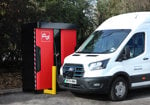Competency is the critical issue
WITH reference to the article ‘Fleet concerns over foreign drivers’ (Fleet News, January 4), fleet managers’ understanding of overseas driving licences is the least of their problems.
A fleet manager has to do all that is reasonably practicable to ensure the licence is an original, is valid and has the correct entitlement. The best place to start is the DVLA.
However, it is not only employing a driver with a dodgy licence that will lead you into trouble.
The critical issue is whether a foreign driver is competent to either drive a vehicle or operate any equipment associated with it, such as a hydraulic crane, electric winches or digital tachographs. This could mean the difference between endangering himself, someone else, or not.
To know this requires a risk assessment of the driver, which should highlight any weaknesses and dictate what training – if any – is appropriate.
The potential driver should also understand UK traffic law and the company’s fleet health and safety policy, particularly regarding issues such as driving safely and driving when tired.
With the harmonisation of European driving licences operating in a similar time frame to hell freezing over, accepting a piece of paper as the ticket to drive will remain a problem for fleet managers for some time to come.
But if the focus is placed firmly on basic risk assessment for effectively managing risk and meeting your duty of care, it matters little whether the driver comes from Poland or Peterborough.
BILL POWNALL
Motor risk manager, Norwich Union
Name and shame the culprits
HAVING read the letter about unacceptable treatment from a dealer and a manufacturer, ‘Offer is unacceptable’ (Fleet News, January 18), I’m disappointed that you don’t name either of the two parties concerned.
They are only less likely to repeat the bad service when they are know they would be adversely affected.
Examples of good service would be equally welcomed and you could keep a record of both on www.fleetnews.co.uk to encourage visitors.
I would understand that letters are printed with responsibility on the writer, while I would also suggest an additional data column for those who provided poor service but who subsequently corrected it.
PAUL JAMES
Head of finance, Festival Housing Group
Improving customer relationships is key
THE recent feature ‘The Fleet Crystal Ball’ (Fleet News, January 4) highlighted that risk and environmental issues are significantly playing on people’s minds.
These will undoubtedly have a big impact on the sector this year, but we shouldn’t overlook some of the other key issues.
New regulations and government legislation will continue to shape working relationships and service delivery.
For example, the introduction of the PAS125 Kitemark standards for vehicle repairers is welcome, particularly for bodyshops.
With such legislation there needs to be a balance between policies that develop the industry and red tape that causes unnecessary complications.
We will also see further legislation, such as the revisions to the Working Time Directive requiring companies to re-evaluate their operations and co-operate closely with their suppliers, customers and peers.
Relationships between customers and outsourced service providers will also shift as the revival of the company car presents increased cost and management implications.
As more customers become increasingly strategic about choosing a partner, the emphasis on demonstrating tangible benefits to their operational needs and the consistent delivery of results will be key. Undoubtedly, the next year will present a fresh set of challenges but building effective relationships that focus on the customer will help all groups within the industry to pull together and maximise the opportunities that these present.
TRACY PEPPER
Managing director, FMG Support
Are we in a time warp?
I HAVE just read the ‘Thinking CAP’ (Fleet News, January 11) column and in particular the piece covering the new Citroën C4 Picasso LX.
I had also picked up on the fact there was no radio in this model from the information pack sent.
This followed hard on the heels of another round of price rises from various manufacturers, Citroën included, and I really had to pinch myself that we had not entered a time warp and were back in the ‘60s or ‘70s when no radio and regular three-monthly price hikes were the norm.
Is the radio not an essential part of vehicle safety? It reduces boredom on long journeys, offers traffic information about roads and keeps the kids amused.
Interestingly, the German manufacturers who were notorious for not fitting radios as standard now see the need for in-car entertainment.
With regard to the price fit that Martin Ward mentions, would fleets rather have the dreaded cruise control as an option rather than as standard, enabling the vehicle to have a radio as standard within the same price band?
If the progression continues and the scientists are correct we should be able to remove in-car heaters in all new models as from 2010 due to the continuance of global warming. Now that really would place us in a time warp.
Name and address supplied
Get a letter published in Fleet News and you will receive a fantastic 512Mb computer memory stick worth £15 courtesy of fleet software and occupational road safety specialist Jaama. The stick can be filled with your own documents, presentations and spreadsheets for easy movement between computers and locations.
By writing to Fleet News you agree to have your details passed on to Jaama and may receive offers from or in association with Emap Consumer Media unless you state otherwise.















Login to comment
Comments
No comments have been made yet.